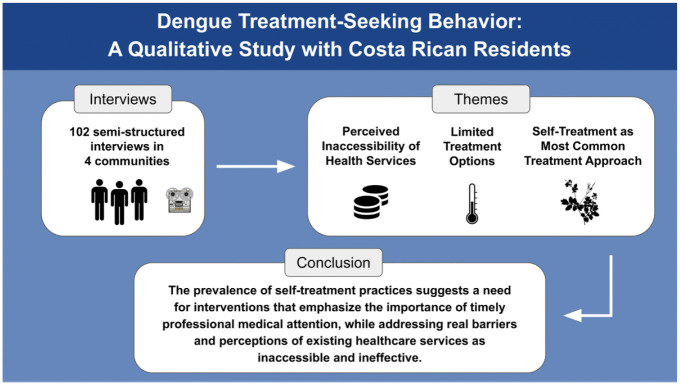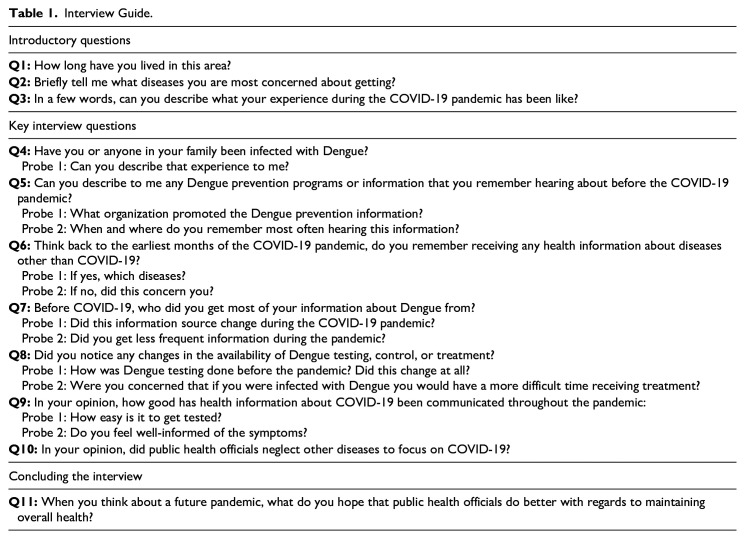Alexander Le, Sara Ali, Christine C Blackburn, Leslie Ruyle, Jessica Hernandez, Farid Abarca, Araceli Arroniz, Sanny Rivera, Kaylee Jerman, Neha Kashyap, Edward Davila, Kathryn Ortega, Yesenia Zavala
下载PDF
{"title":"登革热求医行为:对哥斯达黎加居民的定性研究。","authors":"Alexander Le, Sara Ali, Christine C Blackburn, Leslie Ruyle, Jessica Hernandez, Farid Abarca, Araceli Arroniz, Sanny Rivera, Kaylee Jerman, Neha Kashyap, Edward Davila, Kathryn Ortega, Yesenia Zavala","doi":"10.1177/10901981241254073","DOIUrl":null,"url":null,"abstract":"<p><p>Treatment-seeking behavior (TSB) in relation to dengue infection is a critical aspect of public health, and understanding the factors that influence it is crucial for effective disease management. This research delves into key determinants of dengue TSB by examining the perceptions and behaviors of individuals in Costa Rica, in relation to the Health Belief Model (HBM). This study utilized naturalistic inquiry and incorporated a qualitative research design involving nine students organized into four teams, with at least one student on each team with high Spanish fluency. In total, we initiated 102 semi-structured field interviews with Costa Rican residents in four communities. The interviews were recorded, transcribed verbatim, and coded in several cycles using MAXQDA 2022©. Thematic analysis was used to identify patterns and themes using an inductive approach. We found that several HBM themes influenced dengue TSB among participants. Self-treatment was the most common initial step in managing dengue. Perceived inaccessibility of health care services and perceived ineffective treatment options discouraged medical care-seeking. Ultimately, the prevalence of self-treatment practices suggests a need for interventions that emphasize the importance of timely professional medical attention, while addressing real barriers and perceptions of existing health care services as inaccessible and ineffective. These findings provide a key perspective on dengue TSB, guiding future public health strategies aimed at optimizing health-seeking behaviors and mitigating the negative impacts of dengue on population health.</p>","PeriodicalId":12974,"journal":{"name":"Health Education & Behavior","volume":" ","pages":"826-833"},"PeriodicalIF":2.1000,"publicationDate":"2024-12-01","publicationTypes":"Journal Article","fieldsOfStudy":null,"isOpenAccess":false,"openAccessPdf":"https://www.ncbi.nlm.nih.gov/pmc/articles/PMC11566073/pdf/","citationCount":"0","resultStr":"{\"title\":\"Dengue Treatment-Seeking Behavior: A Qualitative Study With Costa Rican Residents.\",\"authors\":\"Alexander Le, Sara Ali, Christine C Blackburn, Leslie Ruyle, Jessica Hernandez, Farid Abarca, Araceli Arroniz, Sanny Rivera, Kaylee Jerman, Neha Kashyap, Edward Davila, Kathryn Ortega, Yesenia Zavala\",\"doi\":\"10.1177/10901981241254073\",\"DOIUrl\":null,\"url\":null,\"abstract\":\"<p><p>Treatment-seeking behavior (TSB) in relation to dengue infection is a critical aspect of public health, and understanding the factors that influence it is crucial for effective disease management. This research delves into key determinants of dengue TSB by examining the perceptions and behaviors of individuals in Costa Rica, in relation to the Health Belief Model (HBM). This study utilized naturalistic inquiry and incorporated a qualitative research design involving nine students organized into four teams, with at least one student on each team with high Spanish fluency. In total, we initiated 102 semi-structured field interviews with Costa Rican residents in four communities. The interviews were recorded, transcribed verbatim, and coded in several cycles using MAXQDA 2022©. Thematic analysis was used to identify patterns and themes using an inductive approach. We found that several HBM themes influenced dengue TSB among participants. Self-treatment was the most common initial step in managing dengue. Perceived inaccessibility of health care services and perceived ineffective treatment options discouraged medical care-seeking. Ultimately, the prevalence of self-treatment practices suggests a need for interventions that emphasize the importance of timely professional medical attention, while addressing real barriers and perceptions of existing health care services as inaccessible and ineffective. These findings provide a key perspective on dengue TSB, guiding future public health strategies aimed at optimizing health-seeking behaviors and mitigating the negative impacts of dengue on population health.</p>\",\"PeriodicalId\":12974,\"journal\":{\"name\":\"Health Education & Behavior\",\"volume\":\" \",\"pages\":\"826-833\"},\"PeriodicalIF\":2.1000,\"publicationDate\":\"2024-12-01\",\"publicationTypes\":\"Journal Article\",\"fieldsOfStudy\":null,\"isOpenAccess\":false,\"openAccessPdf\":\"https://www.ncbi.nlm.nih.gov/pmc/articles/PMC11566073/pdf/\",\"citationCount\":\"0\",\"resultStr\":null,\"platform\":\"Semanticscholar\",\"paperid\":null,\"PeriodicalName\":\"Health Education & Behavior\",\"FirstCategoryId\":\"1085\",\"ListUrlMain\":\"https://doi.org/10.1177/10901981241254073\",\"RegionNum\":3,\"RegionCategory\":\"医学\",\"ArticlePicture\":[],\"TitleCN\":null,\"AbstractTextCN\":null,\"PMCID\":null,\"EPubDate\":\"2024/5/23 0:00:00\",\"PubModel\":\"Epub\",\"JCR\":\"Q2\",\"JCRName\":\"PUBLIC, ENVIRONMENTAL & OCCUPATIONAL HEALTH\",\"Score\":null,\"Total\":0}","platform":"Semanticscholar","paperid":null,"PeriodicalName":"Health Education & Behavior","FirstCategoryId":"1085","ListUrlMain":"https://doi.org/10.1177/10901981241254073","RegionNum":3,"RegionCategory":"医学","ArticlePicture":[],"TitleCN":null,"AbstractTextCN":null,"PMCID":null,"EPubDate":"2024/5/23 0:00:00","PubModel":"Epub","JCR":"Q2","JCRName":"PUBLIC, ENVIRONMENTAL & OCCUPATIONAL HEALTH","Score":null,"Total":0}
引用次数: 0
引用
批量引用




 求助内容:
求助内容: 应助结果提醒方式:
应助结果提醒方式:


